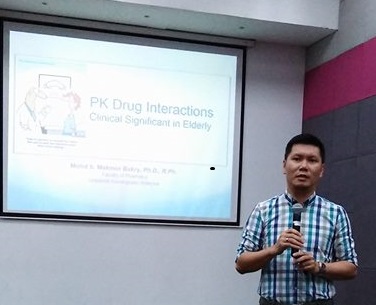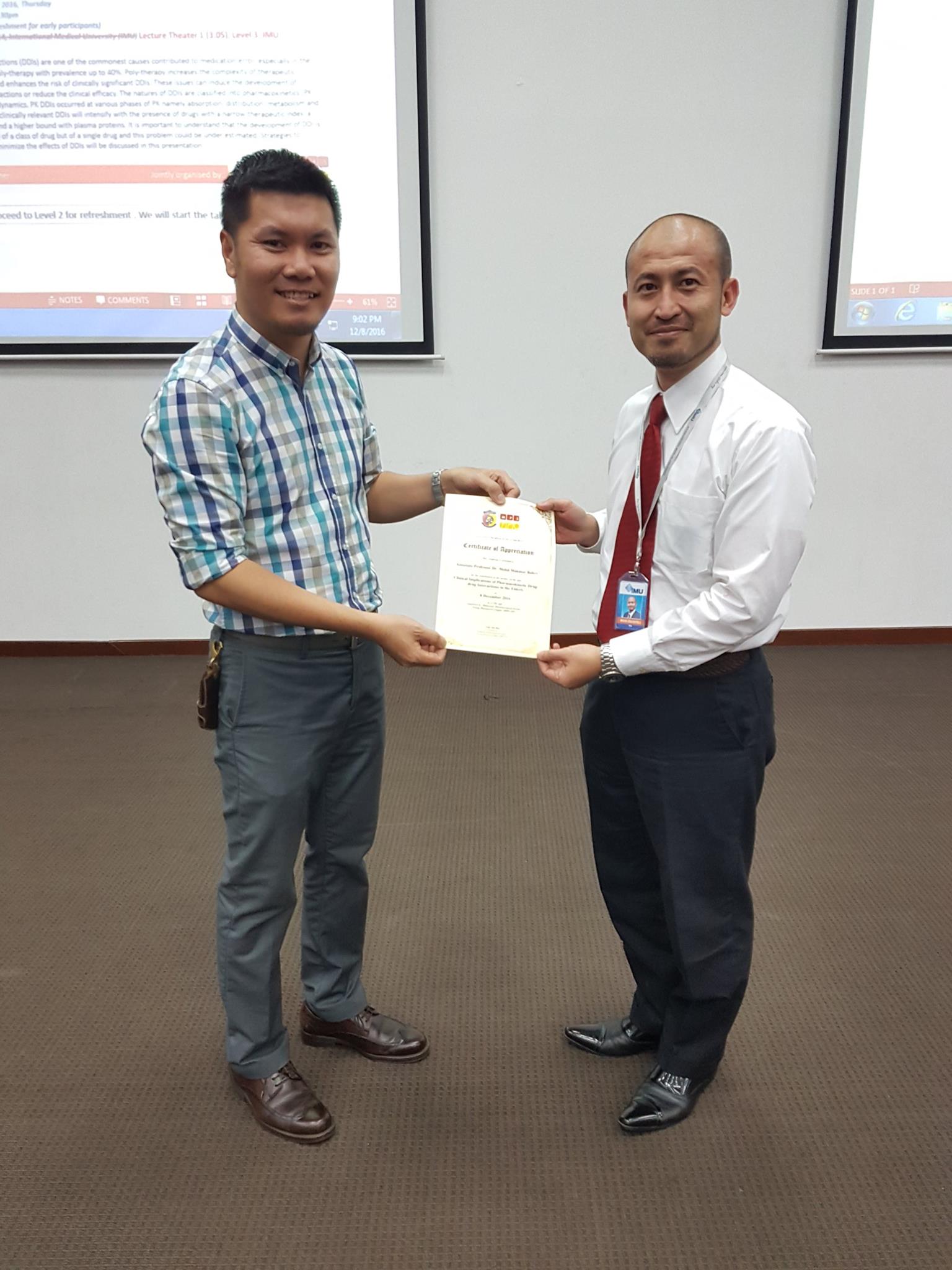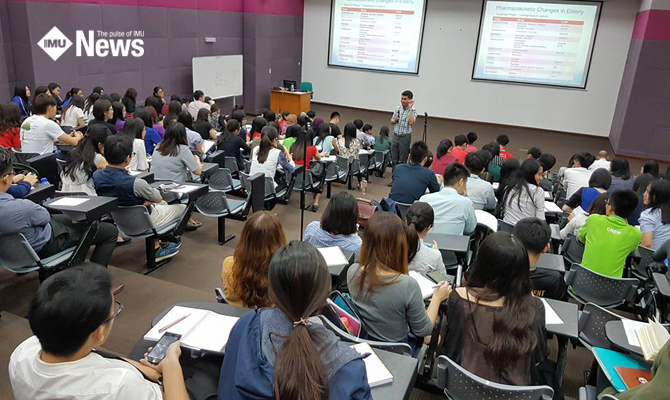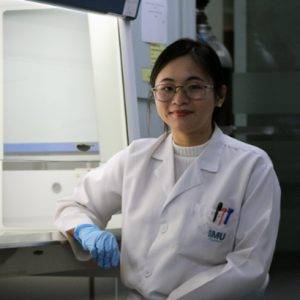8 December 2016 – A talk titled “Clinical Implications of Pharmacokinetic Drug-drug Interactions in the Elderly” was held as a joint effort between IMU Alumni and Malaysian Pharmaceutical Society – Young Pharmacist Chapter. The speaker of the night was A/Prof Mohd Makmor Bakry, the Deputy Dean (Graduate, Research and Innovation) and Head for Quality Use of Medicine Research Group in Universiti Kebangsaan Malaysia. He completed his Bachelor of Pharmacy (Hons) at Universiti Kebangsaan Malaysia in 1999, and his Master of Pharmacy (Clinical) at Universiti Sains Malaysia in 2000. He then obtained his Doctor of Philosophy (Medicine & Therapeutics) from the University of Glasgow in 2007. His specialisation and research interests include Clinical Pharmacy Practice, Clinical Pharmacokinetics and Pharmacotherapy in Epilepsy and Critical Care.  The speaker started the session by shedding light on the types of drug-drug interactions, which included pharmacokinetic drug-drug interactions. He then discussed the physiological changes in the elderly, such as changes in gastrointestinal, renal and pulmonary function that may affect pharmacokinetic activity of drugs. Drug-drug interactions are of particular concern for the elderly as they generally take multiple medications and the physiological changes from aging increases the risk of adverse effects and toxicity from these drug-drug interactions.
The speaker started the session by shedding light on the types of drug-drug interactions, which included pharmacokinetic drug-drug interactions. He then discussed the physiological changes in the elderly, such as changes in gastrointestinal, renal and pulmonary function that may affect pharmacokinetic activity of drugs. Drug-drug interactions are of particular concern for the elderly as they generally take multiple medications and the physiological changes from aging increases the risk of adverse effects and toxicity from these drug-drug interactions.  He continued the talk by covering the aspects of absorption, distribution, metabolism and excretion (ADME) of drugs in elderly. A/Prof Mohd Makmor Bakry explained that the absorption of drugs can be affected in the elderly as their gastric pH is increased. Due to the effects of aging, the distribution of the drugs may increase or decrease, causing the drug to stay longer or shorter than normal in their bodies. Besides that, the metabolism of drugs is adversely affected by the decreased expression and activity of CYP3A4, a major enzyme required to metabolise most drugs. Excretion of drugs may also be affected due to reduced renal function. As a result from the physiological changes and subsequent effects on the ADME of drugs, the geriatric population has an increased risk of adverse drug reactions and drug toxicity. To conclude the talk, he introduced the American Geriatric Society (AGS) Beers Criteria, which is a list of potentially inappropriate medications to be prescribed for the elderly. He also left the audiences with pointers to detect possible drug interactions, followed by actions that could be taken to address the drug interactions. He ended the talk on a note that preventing drug interactions among elderly would require a collaborative effort from the healthcare providers and the patient.
He continued the talk by covering the aspects of absorption, distribution, metabolism and excretion (ADME) of drugs in elderly. A/Prof Mohd Makmor Bakry explained that the absorption of drugs can be affected in the elderly as their gastric pH is increased. Due to the effects of aging, the distribution of the drugs may increase or decrease, causing the drug to stay longer or shorter than normal in their bodies. Besides that, the metabolism of drugs is adversely affected by the decreased expression and activity of CYP3A4, a major enzyme required to metabolise most drugs. Excretion of drugs may also be affected due to reduced renal function. As a result from the physiological changes and subsequent effects on the ADME of drugs, the geriatric population has an increased risk of adverse drug reactions and drug toxicity. To conclude the talk, he introduced the American Geriatric Society (AGS) Beers Criteria, which is a list of potentially inappropriate medications to be prescribed for the elderly. He also left the audiences with pointers to detect possible drug interactions, followed by actions that could be taken to address the drug interactions. He ended the talk on a note that preventing drug interactions among elderly would require a collaborative effort from the healthcare providers and the patient.
The session was interactive and engaging, as the speaker prompted the audiences for answers and responses throughout the talk. As an IMU pharmacy student myself, the talk was an eye opener because it was a good exposure to the pharmacokinetic drug-drug interactions that could occur in the elderly due to aging. The talk had definitely created an awareness to exercise care in prescribing medications for the elderly.
Written by Lee Jia Yin (Joanne)









